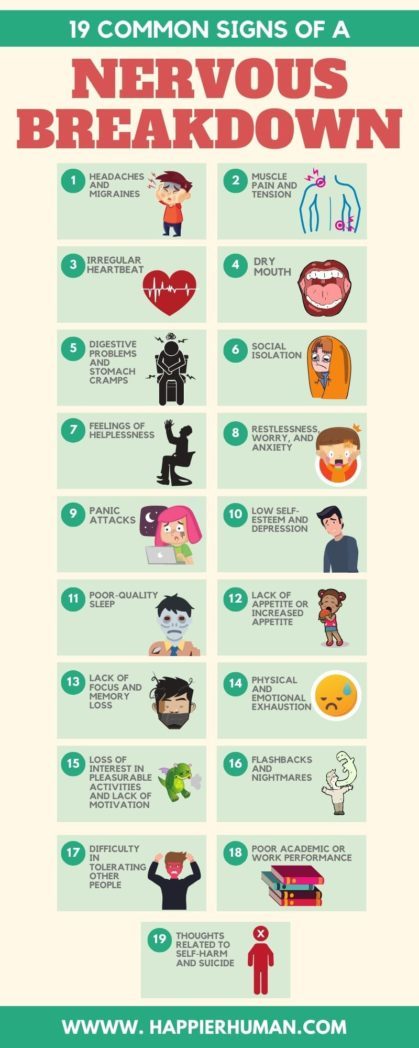Have you ever felt so crushed by life that you could barely find a reason to get out of bed in the morning?
Or perhaps you went through a traumatic experience that has inflicted profound emotional wounds.
Many of us experience nervous breakdowns whenever life takes a turn for the worse, leaving us feeling overwhelmed both physically and emotionally.
But no matter how hard we may fall, many of us eventually find a way to pick ourselves up, dust ourselves off, and find the courage to smile once again.
Sadly, there are also times when a nervous breakdown is the sign of a bigger problem that we may have been neglecting for too long.
In the absence of professional help, nervous breakdowns can have a devastating impact on all areas of our life.
It’s hard to pursue happiness, invest in meaningful relationships, and enjoy a peaceful life when you feel like the entire world is crashing down on you.
To get to the bottom of the problem and learn how to handle a nervous breakdown, we must begin by understanding why nervous breakdowns occur and how we can spot them.
What is a Nervous Breakdown?
A nervous breakdown is a generic term that many of us use to describe an unpleasant mental and physical state characterized by a diffuse sensation of discomfort, increased stress levels, and exhaustion.
The term ‘nervous breakdown’ is neither a medical one nor does it refer to a specific mental condition. In the past, experts have used this term to cover a broad diversity of mental illnesses.
Although today’s clinicians and mental health professionals benefit from a wide range of highly specific diagnostic categories, ‘nervous breakdown’ is still a popular term popular among the general population.

As you can probably imagine, nervous breakdowns can have a profoundly negative impact on our day-to-day life. Furthermore, each of us is prone to develop this problem, especially if we invest all our energy into someone or something else at the expense of our mental health.
Depending on the frequency with which they occur, nervous breakdowns may indicate the presence of severe mental illness such as anxiety or depressive disorder.
The circumstances in which we experience this problem can vary from one person to another.
Sometimes, all it takes is one unpleasant experience (e.g., job loss, the death of a loved one) to trigger a nervous breakdown.
Other times, it takes several weeks or months of constant stress and exhaustion before you experience a nervous breakdown.
When you reach a point where you feel lonely and helpless in the face of life’s hassles, you tend to become nervous, agitated, and restless. You also start to feel uneasy and behave abnormally.
But regardless of the context and factors leading to this problem, the best way to prevent it is by learning to recognize the early signs and symptoms. Also, keep in mind that a nervous breakdown isn’t something you should be terrified of, but rather a wake-up call that motivates you to make some changes in your life.
19 Common Signs of a Nervous Breakdown
Nervous breakdowns cover a wide range of problems and may indicate the presence of severe mental illnesses such as depression or anxiety. The symptoms associated with this condition can impact you both physically and psychologically.
Here are 19 of the most common symptoms of a nervous breakdown:
- Headaches and migraines
- Muscle pain and tension
- Irregular heartbeat
- Dry mouth
- Digestive problems and stomach cramps
- Social isolation
- Feelings of helplessness
- Restlessness, worry, and anxiety
- Panic attacks
- Low self-esteem and depression
- Poor-quality sleep
- Lack of appetite or increased appetite
- Lack of focus and memory loss
- Physical and emotional exhaustion
- Loss of interest in pleasurable activities and lack of motivation
- Flashbacks and nightmares
- Difficulty in tolerating other people
- Poor academic or work performance
- Thoughts related to self-harm and suicide
Since nervous breakdowns are not viewed as a standalone medical condition, but rather the result of multiple stressors, there are no standardized diagnostic and intervention protocols.
However, a licensed mental health professional can identify the underlying psychological condition(s) that can cause nervous breakdowns by carrying out a detailed clinical interview.
Some of the underlying mental disorders that generate frequent nervous breakdowns are acute stress disorder, post-traumatic stress disorder (PTSD), bipolar disorder, chronic depression, and personality disorders.
Furthermore, healthcare professionals might also look at your medical history and even recommend a physical examination. These relatively standard procedures are designed to eliminate the possibility of underlying medical conditions that might be responsible for your intense emotional distress.

Long story short, to determine the exact cause of these symptoms, you need to consult a mental health professional who can evaluate your condition and figure out the underlying factors that may have led to your nervous breakdown.
What Does a Nervous Breakdown Feels Like?
A nervous breakdown indicates that you’ve reached the point of exhaustion after a long period in which you’ve suffered from depression or anxiety due to health, financial, work, or relationship problems.
When stress, anxiety, or depression become overwhelming, you begin to experience feelings of powerlessness and helplessness. In other words, you give up on hope and convince yourself that happiness and peace of mind are distant dreams.
But just because life has taken a turn for the worse doesn’t mean we should deny ourselves the opportunity to enjoy the small pleasure that used to brighten up our days.
Unfortunately, when you’re dealing with a nervous breakdown, chances are we might not be in the mood to enjoy and be grateful for the pleasurable aspects of our lives. In fact, we get so caught up with life’s hassles that we lose sight of our self-care routine.
Habits like taking a relaxing bath, hanging out with friends, or simply going out for a walk, begin to feel burdensome and ‘unnecessary.’ After all, shouldn’t we take care of the problem(s) that have triggered our nervous breakdown first!?
It is in moments like these that we need to remind ourselves that happiness is something we cultivate and nurture, not plan and achieve.
The circumstances in which nervous breakdowns occur differ from one person to another. For some people, one even such as losing their job or going through a breakup is enough to trigger a severe nervous breakdown.
For others, it takes an entire chain of events that generate constant distress to reach the point where they feel like everything is falling apart.
To make matters worse, during stressful periods, you might end up dealing with eating and sleep disorders. In the long run, these problems can generate even more physical and mental exhaustion, thus increasing the severity and frequency of nervous breakdowns.
And that’s why knowing the early signs of a nervous breakdown can help you make healthy changes that will allow you to handle life’s difficult moments without feeling ‘crushed.’

In essence, nervous breakdowns signal the fact that you’ve hit rock bottom. But no matter how difficult life might be right now, keep in mind that hitting rock bottom means the only way you can go from here is UP.
What Causes Nervous Breakdowns?
Most experts agree that nervous breakdowns are the mind’s way of telling us that we’ve bitten more than we can chew. In other words, such unpleasant events may indicate that the demands of our day-to-day life are greater than our internal resources.
There are also cases when a nervous breakdown occurs immediately after an unpleasant or even traumatic event, in which case the source of the problem is obvious.
But since nervous breakdowns could also indicate the presence of a severe underlying mental illness, the process of zeroing in on the exact causes can be laborious and frustrating.
Fortunately, today’s mental health professionals are equipped with an entire arsenal of screening tools and structured clinical interviews.
This comprehensive clinical approach allows them to identify the source of the problem and design an intervention plan that will help the patient achieve mental balance, set realistic goals, and enjoy a fulfilling life without working himself/herself to exhaustion.
So, let’s take the time to understand why some of us may be prone to struggle with nervous breakdowns and explore various factors that can affect the intensity and frequency of such stress-inducing events.
Biological and genetic predispositions
We know for a fact that biology and genetics play a crucial role in how we manage stressful situations, overcome life’s adversities, and cultivate positive emotions such as joy, gratitude, or compassion.
In other words, depending on how our brains are ‘wired,’ we might be prone to struggle with nervous breakdowns whenever life throws us a curveball.
Furthermore, most experts agree that having first degree relatives with mental illness increases our mental and emotional vulnerability. That means, being part of a family with a history of mental illness means you’re more likely to ‘crack’ under pressure and experience nervous breakdowns.
Unfortunately, researchers have yet to determine a way to bypass our genetically inherited vulnerabilities, thus reducing the risk of nervous breakdowns or other psychological vulnerabilities. Although there are drugs (e.g., antidepressants, anxiolytics) which can alter the brain’s chemistry and functionality, their impact is relatively limited.
But just because we inherit genetic traits that may predispose us to poor emotional control and mental illness, doesn’t mean there’s nothing we can do to counteract them.
As always, a healthy and balanced lifestyle can help you overcome adversities, invest in self-growth, and enjoy a fulfilling life.
Traumatic events and stressful life circumstances
Most researchers and clinicians agree that nervous breakdowns are mostly the result of traumatic events and stressful life circumstances.
Just like in the case of most emotional or behavioral problems, environmental factors play a central role in our overall sense of health and well-being. In other words, the environment in which we live – along with its demands and challenges – has a massive impact on our emotional resilience.
For example, if you’re living in a toxic family environment, chances are you might end up dealing with occasional nervous breakdowns.
Other factors which can trigger nervous breakdowns are:
- Divorce or separation
- The death of a loved one
- Job loss or bankruptcy
- The challenges of academic life
- Stressful work environments
- Accidents and natural disasters
- The suffering and disability associated with a medical condition
- Caregiver burden
- The arrival of a newborn baby (especially for first-time parents)
- Relocating to a new city, state, or country.
Not only that such events and life circumstances can lead to nervous breakdowns, but they also have a profound impact on our overall mental health. Without proper treatment, frequent nervous breakdowns can prevent us from achieving a happy and fulfilling life.
Underlying mental disorders
Whenever a patient is dealing with frequent nervous breakdowns, clinicians, and mental health professionals always consider the possibility of an underlying mental illness.
In general, depression and anxiety are some of the most common underlying conditions that can trigger nervous breakdowns. It’s difficult to handle life’s hassles when you’re constantly worrying about the future or ruminating about past events.
The problem with anxiety and depression is that they deplete our body and mind’s resources, making it increasingly challenging to cope with stressful circumstances.
Often, people who experience nervous breakdowns can struggle with panic attacks as well. Symptoms may include sweating, trembling, numbness, breathing difficulties, rapid heart rate, fear of losing control, and fear of dying.
Unless you treat these underlying conditions, you will continue to experience frequent nervous breakdowns that ruin your productivity, prevent you from pursuing your goals, and ‘kill’ your motivation to achieve a happy life.

How to Recover After a Nervous Breakdown
Nervous breakdowns are relatively frequent; most of us had experienced them when we got fired from our job, got dumped by our partner, or grieved the passing of a close family member.
So, what can we do recover after a nervous breakdown and rediscover the joys of a productive and fulfilling life?
Take a break
The first thing you need to do after a nervous breakdown is take a break. Although it might sound like the most trivial piece of advice, many of us fail to do so and insist on carrying out with our day-to-day tasks.
But since our motivation, energy, and mental resources are on low, pushing ourselves to achieve the same results we used to attain will only worsen your overall psychological and physical condition.
Take a break from work or school to pull yourself together without having to worry about the pressures of everyday life. You can use this free time to relax, invest in a hobby, catch up with old friends, meditate, or simply do nothing.
Your body and mind need time to recover so no matter how much stuff you have going on, keep in mind that you can’t run on an empty tank. Sometimes, you need to stop for a moment and enjoy a well-deserved break.
Lasting happiness isn’t about achieving goals no matter what but cultivating a healthy and productive routine. Remember that nervous breakdowns are your body’s way of saying it’s too much and ignoring it will only make things worse.
Spend some time with yourself
When was the last time you spent some time with yourself; just you and your thoughts?
In general, self-exploration and self-discovery help us understand ourselves better, become mindful of our vulnerabilities, and adjust our perspective.
After experiencing a nervous breakdown, it’s essential to spend some time with yourself, away from all those tasks, projects, and deadlines that generate stress and discomfort.
Unfortunately, some of us tend to resort to unhealthy coping strategies such as substance abuse, emotional eating, binge-watching sitcoms, shopping, and pretty much anything that keeps us from confronting our shortcomings and limits.
Spending time with yourself shouldn’t be about avoiding painful emotions and hiding from problems. On the contrary, use this opportunity to face your inner demons and understand that no matter how challenging and unpleasant life can get, you can always find the strength to smile and keep pursuing your dreams.
Cultivate self-care
Spending some time with yourself isn’t just about self-exploration but also self-care. In other words, it’s crucial to invest in activities and habits that help you recover.
Self-care refers to any activity through which we show compassion towards our bodies and minds. It could be anything from taking a relaxing bath, to setting an appointment with a therapist who can help you work through your issues.
A recent paper published in Current Psychiatry revealed that self-compassion buffers against the harmful effects of self-criticism, thus leading to emotional resilience.
An emotionally resilient mind is less prone to ‘crack’ under stressful circumstances and more capable of handling challenges without working itself to exhaustion.
Long story short, self-care is a healthy practice that not only helps us recover after a nervous breakdown but also reminds us that happiness and peace of mind are far more valuable than money, social status, and professional success.
Adjust your perspective and reevaluate your priorities
We know for a fact that frequent nervous breakdowns are a clear sign that something is not ok. The source of the problem might be your job, relationship, or toxic family environment.
But no matter how unpleasant nervous breakdowns might feel, such events provide an excellent opportunity to set our priorities straight and adjust our perspective.
Sometimes, the reason why we end up dealing with nervous breakdowns is that we take on more tasks and projects than we can ‘carry.’ We get so caught up with work that we forget to take care of ourselves.
That’s why it’s crucial to adjust your perspective, set more realistic goals, and reevaluate your priorities. You can’t achieve lasting happiness by investing all your time and energy into other people’s dreams.
Put your health and well-being first in your priorities, and everything else will run smoothly.
It might feel strange at first – to focus on your needs, desires, and ideals – but eventually, you will discover that a happy, healthy, and fulfilling life doesn’t always depend on how much you accomplish at work or in school.
Be kind to yourself by accepting your limits and achieving personal and professional success at your own pace.
Seek professional help
Since nervous breakdowns are often accompanied by an entire array of physical and psychological symptoms, perhaps it would be wise to consult a professional.
The depression and anxiety associated with such intense and dramatic events can aggravate your overall condition, leading to devastating consequences in the long run.
With the help of a licensed counselor or therapist, you can explore the stressors in your life, gain a better understanding of your strengths and weaknesses, and learn practical strategies to handle stress and prevent nervous breakdowns.
But just because you’ve experienced a nervous breakdown doesn’t necessarily mean that you need professional help. The human mind is remarkably resilient and can find a way to adapt even in the darkest circumstances.

That’s why the first steps to recovery involve spending time with yourself, reevaluating your priorities, and cultivating self-care.
However, if you’re having trouble implementing these steps and the unpleasant effects last for more than 4-5 weeks, then you probably need to consult a mental health professional.
5 Strategies to Prevent a Nervous Breakdown
Preventing nervous breakdowns is a matter of emotional balance, discipline, and healthy habits. It’s about maintaining an optimistic and solution-oriented attitude in the face of challenges and change.
If you wish to prevent nervous breakdowns from ruining your mood, you need to cultivate a few essential habits that will boost your physical and mental resilience.
1. Exercise regularly
Ask any physician or mental health professionals, and they will tell you that physical activity is a cheap, natural, and highly effective way to boost your health and increase your resilience to stress.
Over the years, numerous studies have revealed the amazing health effects of regular exercising. From alleviating the unpleasant symptoms of anxiety and depression to helping us deal with stress, keeping yourself physically active throughout the day is one of the simplest ways to cultivate a resilient mind.
No matter how busy you are, it’s always good to set aside at least thirty minutes each day for physical activity. It doesn’t matter if you prefer to hit the gym or go for a quick run; what’s important is to make exercising something fun and pleasant. That way, easier for you to turn it into a healthy routine.
2. Take a yoga class
Since we’re on the topic of physical activity, perhaps a fun and exciting way to get some exercise is yoga.
Yoga is one of the most effective methods for reducing stress, combining controlled movements, stretching, breathing techniques, and meditation.
In fact, studies indicate that yoga can have a significantly positive impact on anxiety, stress, and depression, providing an opportunity for the mind and body to relax and ‘recalibrate.’
Practicing yoga regularly helps you cultivate a good mood by making you more aware of the present moment. Through different postures and controlled movements, yoga stretches your body in a way that relaxes the muscles and relieves any pain point that might generate tension.
If you wish to avoid an unpleasant nervous breakdown, take up a yoga class. It might feel difficult or uncomfortable at first, but after several weeks of constant practicing, you will begin to experience the fantastic benefits of this activity.
3. Try some meditation and breathing exercises
In recent years, meditative practices have received massive interest from both researchers and people who wish to improve their sense of health and well-being.
If we look beyond preconceptions and controversies, we realize that meditation has become a lifestyle for many people. Many of them claim that meditation and breathing techniques have helped them escape from everyday stress, cope with their anxieties, broaden their emotional horizons.
A 2016 study published in Psychological Reports concluded that “mindfulness may play a role in regulating positive and negative emotions.” In other words, by facilitating emotional resilience, mindfulness can reduce the risk of nervous breakdowns during stressful periods.
Since we’re living in the digital era, the Internet is bristling with helpful websites, videos, and guides on how to turn meditation into a daily habit.
Just like in the case of yoga, it takes constant practice to achieve the full benefits of meditation and breathing techniques.
4. Avoid psychoactive substances
When we’re dealing with nervous breakdowns, many of us may be tempted to resort to unhealthy coping strategies such as alcohol or substance abuse. That’s because it’s easier to numb your emotional pain, instead of working through your issues and cultivating emotional resilience.
Unfortunately, perpetuating unhealthy coping strategies such as substance abuse can lead to severe health problems. Furthermore, there’s a strong possibility that substance use can lead to an increase in the frequency of nervous breakdowns.
As a preventive measure, experts recommend keeping away from psychoactive substances such as nicotine, alcohol, caffeine, marijuana, LSD, or cocaine.
Even though facing and accepting your limits and vulnerabilities might be challenging and unpleasant, this approach is one of the safest and healthiest ways to lower the chances of dealing with a nervous breakdown.
5. Maintain a healthy work-life balance
One of the main factors contributing to the onset of nervous breakdowns is poor work-life balance. The ever-growing demands of a competitive work environment coupled with long hours at the office have ‘forced’ us to neglect our personal life.
Work-life balance differs from person to person. However, this approach attempts to resolve the increasingly common conflict between personal life (family, friends, hobbies, romantic relationships) and career.
Maintaining work-life balance can help you manage stress, avoid burnout, and reduce the likelihood of a nervous breakdown.

The first step in finding this balance is to think about both the demands of the workplace and those of your personal life.
In other words, you must strive to establish a set of rules that will allow you to become more efficient at work without having to sacrifice your personal life.
Talk to your friends, life partner, or family members about this issue and see if they think you spend too much time at the office.
Prioritize your work tasks and the events you must attend, both at work and in your private life.
Invest in new and exciting hobbies that generate positive emotions and take your mind off work.
In a nutshell, the secret to happiness and fulfillment – personally and professionally – is maintaining a healthy work-life balance.
Final Thoughts on Nervous Breakdowns
In essence, nervous breakdowns are your body’s way of telling you that you’ve reached the point where you need to pause for a moment and reevaluate your priorities.
Just because clinicians don’t view nervous breakdowns as a standalone mental disorder doesn’t mean we should ignore them. Often, these events signal the presence of a more severe condition like anxiety or depression.
If you wish to survive a nervous breakdown and prevent such events from ruining your good mood, it’s important to:
- Take some time off work/school and focus on your needs, desires, dreams, and goals.
- Invest in self-care practices such as yoga and meditation.
- Stay physically active.
- Avoid psychoactive substances.
- Focus on cultivating a healthy work-life balance.
Happiness isn’t something that we achieve solely through professional growth, but a lifelong pursuit that involves both personal and professional success.
Finally, if you're looking for more helpful resources, check out the following posts:
- 7 Warning Signs That You Need a Mental Health Break
- 10 Warning Signs of a Nervous Breakdown
- 6 Anxiety Disorders Types: Signs, Symptoms & Treatment Options


Alexander Draghici is a licensed Clinical Psychologist, CBT practitioner, and content writer for various mental health websites. His work focuses mainly on strategies designed to help people manage and prevent two of the most common emotional problems – anxiety and depression.

